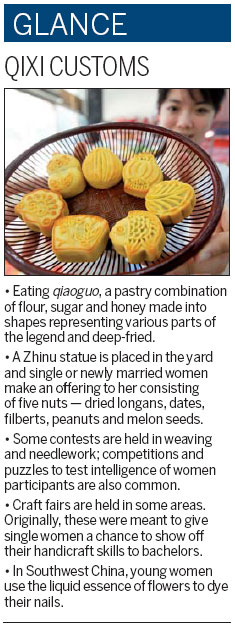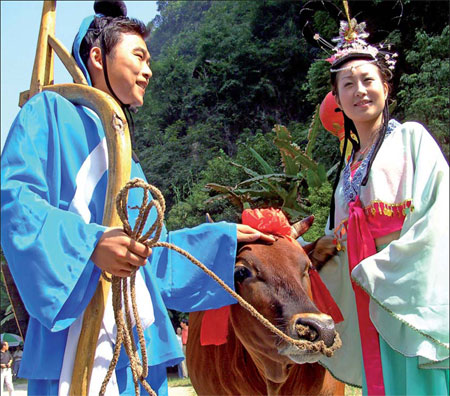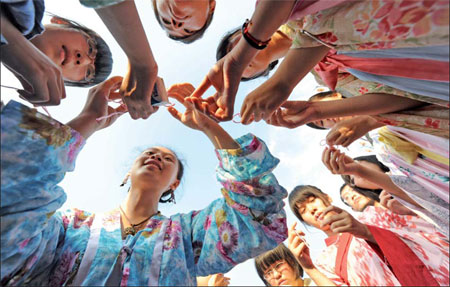Timeless love

|
Top: Chinese youth dress up as Niulang and Zhinu to celebrate the Qixi Festival. Above: Girls dressed in hanfu gather together to practice and show off their needlework. Photos Provided to China Daily |
Chinese 'Valentine's Day' experiences revival among the young
 |
American Sean Naismith intends to propose to his girlfriend on Aug 23. "My girlfriend is Chinese and I wanted to do it on that special day, which is also a traditional festival known as Qixi or Chinese Valentine's Day," the 28-year-old Naismith says. Naismith is just one of an increasing number of foreigners and younger Chinese who are turning or returning to the festival to show their love for their partners.
The Chinese Qixi Festival, or the Seventh Night Festival, falls on the seventh day of the seventh lunar month. This year, it is on Thursday, Aug 23.
His girlfriend told him the festival is based on a tragic love tale: a Chinese couple, Niulang (cowherd) and Zhinu (fairy weaver girl), who were separated by Wangmu (the supreme goddess of heaven) after she became angry that a fairy had married a mortal. The lovers could only meet once a year on a bridge formed by magpies that took pity on the two.
Most Chinese will remember the tale as children. If it rains heavily on the evening of Qixi, some elderly Chinese will say it is Zhinu crying on that day as she met her husband Niulang on the Milky Way.
The festival can be traced back to the Han Dynasty (206 BC-AD 220). Historical records from the Eastern Jin Dynasty (AD 317-420) also mention the festival, while records from the Tang Dynasty (AD 618-907) describe a grand evening banquet linked to the event.
By the Song (960-1279) and Yuan (1271-1368) dynasties, there were numerous references to Qixi in literary circles.
While the tale of Niulang and Zhinu is a story of timeless love, the fairy was also known to be intelligent and a skilled seamstress. As such, the festival goes by the name Qiqiao Festival, which alludes to the skills of the fairy seamstress.
The day is often characterized by girls praying for intelligence and talent.
Chen Jianguo, a scholar of the Chinese Folk Literature and Art Society, does not think Qixi should be solely considered a Chinese Valentine's Day and linked to the commercialism that infects increasingly popular imported festivals, such as the Western Valentine's Day that call more for chocolates, roses and candlelit dinners than Chinese customs.
"Niulang and Zhinu are a married couple and had children," Chen says. "The Qixi Festival conveys the loyal love between married couples who want to live to a ripe old age in conjugal bliss. It's totally different from the love of the unmarried."
Tian Gao, a folklore scholar of Peking University, thinks Qixi should be taken holistically and believes that it still has a similar basis to that of Valentine's Day - love.
"The Qixi Festival is derived from the needs of lovers," Tian says.
"In the past, girls would conduct a ceremony to beg Zhinu for wisdom and pray for a good husband. Married couples also prayed for a harmonious life."
But Qixi was also known in the past as the Daughters' Festival, focusing on girls.
"It is very important to protect traditional Chinese festivals and restore traditional practices and customs," Tian says. "This might mean avoiding commercialization and allowing more young people to really understand it."
Still, the Qixi Festival, which was listed as an intangible cultural heritage in 2006, has started to regain some of its original meaning and popularity among the Chinese, especially the young.
In Beijing alone, an increasing number of young women can be seen gathering in public squares and gardens to practice needlework and display their handmade hanfu or traditional Chinese costumes.
Members of these hobby groups also select Chinese herbs to make fragrant sachets as tokens of love.
"We do this to preserve our traditional culture in modern society," says Lin Lin, a university student.
Dressed in traditional national robes and holding incense, the girls follow some of the ancient rituals associated with Qixi.
"We regard it as a unique day for girls. According to tradition, girls prepared pastries, fruit and incense as offerings to Zhinu on that day, praying to acquire skills in needlecraft," Lin says.
Other traditional activities to celebrate Qixi are similarly being kept alive.
For example, many couples go to temples to pray on that day to specific Chinese deities to seek blessings for their relationship and eternal happiness.
Those who are familiar with the festival also look into the night sky for two stars, Altair and Vega, to see how Niulang and Zhinu shine bright on the Milky Way.
Others attend the "Valentine's" celebrations in the malls and hotels of international and cosmopolitan cities such as Beijing and Shanghai, where shops promote sales of sweets, jewelry and dinners associated with the festival.
"The revival in interest over Qixi among young people can be attributed to two reasons," says Zheng Zhenze, a folklore professor at the Chinese Folklore Society.
"First, it is a natural response to the challenges of Western festivals. Second, people still need special occasions to channel their affections."
yinyin@chinadaily.com.cn
(China Daily 08/17/2012 page26)
Today's Top News
- China, US hold maritime safety talks in Hawaii as Beijing reiterates warnings on sovereignty
- China sends letter to UN over Japanese PM's remarks on Taiwan
- Chinese, Uzbek FMs hold second strategic dialogue
- G20 an opportunity to strengthen Sino-EU ties
- China, Africa foster shared food security
- Japan urged to take practical steps to honor its commitments to China

































